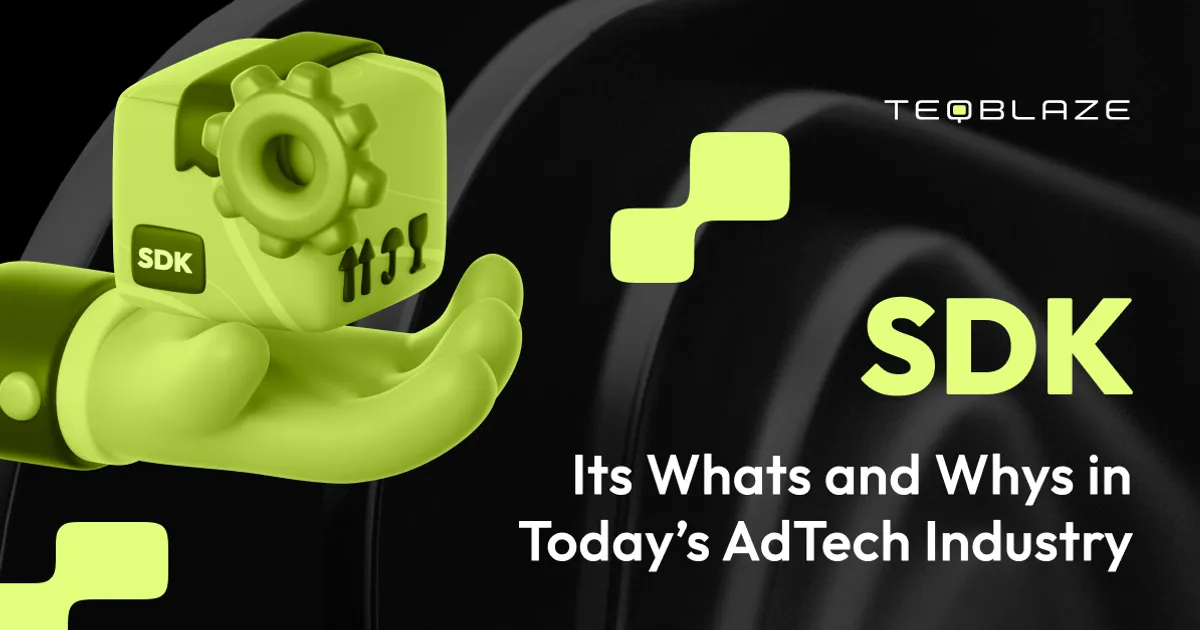In the ever-evolving landscape of technology, where innovation drives progress at breakneck speed, one acronym consistently stands out in the realm of app development: SDK. Short for Software Development Kit, an SDK is more than just a collection of tools and resources; it represents a fundamental pillar upon which modern applications are built. For both seasoned developers and newcomers alike, understanding the nuances of SDKs — what they encompass, their significance, and their practical applications — is essential for navigating the complexities of contemporary app development.
The SDK concept has become especially popular with the AdTech industry, as it grants many companies the freedom of custom-tailored programmatic advertising that comes truly efficient and at a cheaper price. Hence, we will today let you into the world of SDKs, explaining everything you might want to know about it. We will unravel their core components and discuss their pivotal role in app development while also examining their impact on both a company’s productivity and innovation. From decoding the fundamental aspects of SDKs to exploring real-world applications and statistical insights, this journey will equip you with the knowledge needed to harness the full potential of SDKs in your projects.
First things first: what is an SDK?
SDKs, or Software Development Kits, are essential tools in the realm of modern app development, playing a pivotal role in enhancing efficiency and functionality. These kits, provided by hardware and software vendors, encompass a comprehensive set of resources, guidelines, and programs tailored to streamline the app creation process for specific platforms, devices, or operating systems. An average SDK serves as nothing else but a foundational developer’s toolkit comprising:
Libraries: These prewritten code snippets simplify common programming tasks, saving developers valuable time.
Application Programming Interfaces (APIs): APIs facilitate seamless communication between different software components, enhancing interoperability.
Integrated Development Environments (IDEs): IDEs consolidate essential tools like source code editors and debuggers into a single platform, streamlining development.
Documentation: Comprehensive guides and tutorials aid developers in leveraging SDK components effectively.
Testing Tools and Compilers: These tools identify and rectify coding errors, ensuring the final app functions smoothly.
Sample Code: Practical examples that serve as valuable learning aids and references for developers.
There is no wonder why developers find SDKs as an integral part of their professional toolkits, with an average developer using something between 14 to 18 SDKs in their day-to-day activities. Sure enough, it all depends on how custom the SDK is and how compatible it is with the particular project’s business and tech goal. Yet, in general, SDKs are great when it comes to facilitating custom software development.
SDK and their role in AdTech
Custom Software Development Kits (SDKs) play a crucial role in the realm of adtech software development, offering tailored solutions that address specific needs and challenges within the advertising technology landscape. Unlike off-the-shelf SDKs, which provide general functionalities, custom SDKs, especially the white-label ones, are meticulously crafted to integrate seamlessly with proprietary systems, optimize performance, and unlock unique capabilities that align precisely with business objectives. This bespoke approach not only enhances operational efficiency but also empowers AdtTch companies to differentiate themselves in a highly competitive market.
One of the primary advantages of custom SDKs in AdTech software development lies in their ability to streamline the integration of complex advertising functionalities. Advertisers and publishers often require tailored solutions that go beyond standard ad serving and analytics capabilities. Custom SDKs enable developers to embed specialized features, such as advanced targeting algorithms, real-time bidding (RTB) protocols, and sophisticated ad formats directly into their applications. This level of customization not only improves the overall user experience by delivering more relevant and engaging ads but also enhances monetization opportunities through optimized ad placements and performance metrics.
Moreover, custom SDKs offer AdTech companies greater control and flexibility over their software ecosystem. By developing proprietary SDKs, companies can maintain their unique algorithms, data privacy protocols, and performance optimizations tailored to their specific business models and regulatory requirements. This control over the technology stack ensures compliance with industry standards and regulations while mitigating risks associated with third-party dependencies. Additionally, custom SDKs facilitate rapid iteration and deployment cycles, allowing developers to respond swiftly to market demands and technological advancements without compromising on performance or security.
SDKs in ad tech: the stats are nothing less than impressive
In the dynamic landscape of ad tech, where innovation and agility are paramount, custom SDKs empower companies to innovate beyond conventional advertising solutions. They serve as enablers for experimental features, AI-driven optimizations, and personalized ad experiences that resonate with target audiences. This innovation potential not only strengthens competitive positioning but also fosters long-term partnerships with advertisers and publishers seeking cutting-edge solutions.
In fact, the above-mentioned benefits of SDKs can explain their incredible adoption and performance stats in the industry:
85% Adoption Rate
As per Business of Apps, over 85% of top-grossing apps in the AdTech sector integrate at least one SDK for functionalities such as ad serving, analytics, or user engagement. This high adoption rate underscores the importance of SDKs in optimizing app performance and monetization strategies.
30% Boost in Monetization
According to App Annie, apps integrated with SDKs for mobile advertising experience an average revenue increase of 30% compared to those without SDKs. This statistic highlights the significant role SDKs play in driving ad revenue through enhanced targeting, performance optimization, and ad format flexibility.
70% Developers’ Favorite
AdExchanger claims that approximately 70% of ad tech developers prefer using custom SDKs over generic solutions due to their ability to tailor functionalities to specific business needs and improve operational efficiency. This preference reflects the growing demand for bespoke adtech solutions that deliver superior performance and user engagement.
95% Integration Into Apps
As per Statista, SDKs are integrated into over 95% of mobile apps in the global AdTech market, ranging from gaming and social networking to e-commerce and news platforms. This widespread adoption underscores SDKs' versatility in supporting diverse advertising strategies and enhancing app monetization across various industries.
50% Boost in Ad Fill Rates
Mobile Marketing Association states that apps that leverage SDKs for real-time bidding (RTB) experience a 50% increase in ad fill rates and a 35% decrease in latency compared to apps relying on traditional ad-serving methods. This performance enhancement is crucial in ensuring seamless ad delivery and maximizing revenue opportunities for AdTech companies and developers.
Ultimately, the value of custom SDKs in AdTech software development lies in their ability to drive innovation, enhance operational efficiency, and deliver tailored experiences that meet the evolving demands of the digital advertising ecosystem.
Use cases of SDKs
Now that we know so much about the benefits SDKs bring to the AdTech industry let’s have a look at three of the most popular SDK use cases.
Mobile App Development
In the realm of mobile app development, SDKs are instrumental in simplifying complex tasks such as user authentication, payment processing, and analytics integration. For instance, SDKs provided by major platforms like iOS and Android offer developers access to platform-specific tools and APIs, facilitating the creation of robust and feature-rich applications tailored to each ecosystem's requirements.
IoT (Internet of Things)
With the proliferation of IoT devices, SDKs have emerged as essential tools for building interconnected solutions. IoT SDKs enable developers to manage device communication, data analytics, and remote monitoring effectively. This capability is pivotal in industries ranging from smart home technology to industrial automation, where seamless integration and interoperability are paramount.
Cloud Services Integration
SDKs play a crucial role in integrating cloud services into applications, enabling functionalities such as data storage, real-time communication, and server-side processing. Providers like AWS, Google Cloud, and Microsoft Azure offer SDKs that empower developers to leverage cloud capabilities without delving into complex backend infrastructures, thus accelerating time-to-market and enhancing scalability.
As the digital landscape continues to evolve, SDKs remain at the forefront of innovation in app development. Their versatility, efficiency, and ability to empower developers with advanced tools and capabilities make them indispensable assets in creating compelling, user-centric applications. By understanding the diverse applications and statistical insights surrounding SDK usage, developers can leverage these tools strategically to drive innovation, enhance productivity, and achieve sustainable success in the competitive app market.
Conclusion
SDKs are not just tools; they are indispensable assets in the modern app development landscape, especially when it comes to creating refined AdTech products. They streamline development processes, enhance functionality, and open up avenues for innovative monetization strategies. Embracing SDKs empowers developers to achieve sustainable app revenue while prioritizing user satisfaction.
If you are looking for an SDK that would become your development team’s trampoline to business success, make sure to have a look at TeqBlaze’s white-label mobile SDK. This is a game changer because there is no other mobile white-label SDK that would offer seamless integration of so many mobile ad formats.
Interested in learning more about what we can do for you? Get in touch for a free-of-charge consultation with our experts!

 Grigoriy Misilyuk
Grigoriy Misilyuk Anna Vintsevska
Anna Vintsevska





